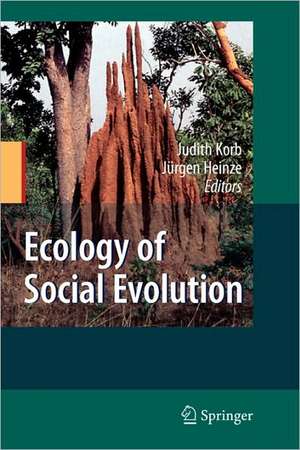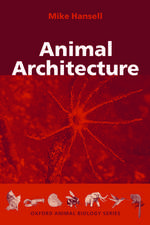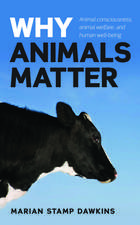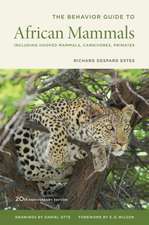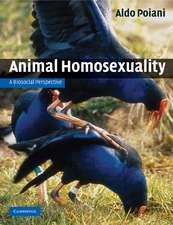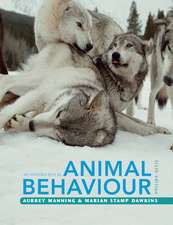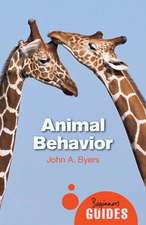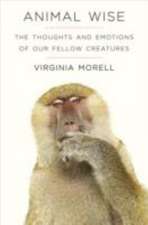Ecology of Social Evolution
Editat de Judith Korb, Juergen Heinzeen Limba Engleză Paperback – 18 oct 2010
| Toate formatele și edițiile | Preț | Express |
|---|---|---|
| Paperback (1) | 1216.02 lei 6-8 săpt. | |
| Springer Berlin, Heidelberg – 18 oct 2010 | 1216.02 lei 6-8 săpt. | |
| Hardback (1) | 1222.80 lei 6-8 săpt. | |
| Springer Berlin, Heidelberg – 17 feb 2008 | 1222.80 lei 6-8 săpt. |
Preț: 1216.02 lei
Preț vechi: 1482.95 lei
-18% Nou
Puncte Express: 1824
Preț estimativ în valută:
232.72€ • 240.41$ • 193.68£
232.72€ • 240.41$ • 193.68£
Carte tipărită la comandă
Livrare economică 26 martie-09 aprilie
Preluare comenzi: 021 569.72.76
Specificații
ISBN-13: 9783642095078
ISBN-10: 3642095070
Pagini: 280
Ilustrații: XII, 266 p.
Dimensiuni: 155 x 235 x 15 mm
Greutate: 0.4 kg
Ediția:Softcover reprint of hardcover 1st ed. 2008
Editura: Springer Berlin, Heidelberg
Colecția Springer
Locul publicării:Berlin, Heidelberg, Germany
ISBN-10: 3642095070
Pagini: 280
Ilustrații: XII, 266 p.
Dimensiuni: 155 x 235 x 15 mm
Greutate: 0.4 kg
Ediția:Softcover reprint of hardcover 1st ed. 2008
Editura: Springer Berlin, Heidelberg
Colecția Springer
Locul publicării:Berlin, Heidelberg, Germany
Public țintă
ResearchDescriere
Research on the evolution of social behaviour has been dominated by genetic relatedness for a long time; however, both recent empirical studies and theoretical concepts give growing evidence for ecological factors acting as very prominent additional or alternative driving forces in social evolution. Now the time is ripe to investigate similarities and differences in the course of social evolution in different animals. This book brings together renowned researchers working on sociality in different animals. For the first time, they compile the evidence for the importance of ecological factors in the evolution of social life, ranging from invertebrate to vertebrate social systems, and evaluate its importance versus that of relatedness.
Cuprins
The Evolution and Ecology of Cooperation – History and Concepts.- The Ecology of Altruism in a Clonal Insect.- The Evolutionary Ecology of Eusociality in Australian Gall Thrips: a ‘Model Clades’ Approach.- The Ecology and Evolution of Helping in Hover Wasps (Hymenoptera: Stenogastrinae).- Why are so Many Bees but so Few Digger Wasps Social? The Effect of Provisioning Mode and Helper Efficiency on the Distribution of Sociality Among the Apoidea.- Social Plasticity: Ecology, Genetics, and the Structure of Ant Societies.- The Ecology of Social Evolution in Termites.- Kin-Recognition Mechanisms in Cooperative Breeding Systems: Ecological Causes and Behavioral Consequences of Variation.- Social Ecology of Horses.- African Mole-Rats: Eusociality, Relatedness and Ecological Constraints.- Genetic and Ecological Determinants of Primate Social Systems.- The Ecology of Social Life: A Synthesis.
Recenzii
From the reviews:
"The ecology of social evolution … attempt to redress a perceived bias for genetic interpretations in the study of social evolution by focussing on the ecological side. … there are new and valuable insights in this book. Readers will find authoritative and up-to-date reviews on a wide range of taxa, from social insects both familiar and unfamiliar, to social vertebrates including cooperatively breeding birds, mole-rats and primates." (Andrew F.G. Bourke, Myrmecological News, Vol. 200 (11), August, 2008)
"The ecology of social evolution … attempt to redress a perceived bias for genetic interpretations in the study of social evolution by focussing on the ecological side. … there are new and valuable insights in this book. Readers will find authoritative and up-to-date reviews on a wide range of taxa, from social insects both familiar and unfamiliar, to social vertebrates including cooperatively breeding birds, mole-rats and primates." (Andrew F.G. Bourke, Myrmecological News, Vol. 200 (11), August, 2008)
Textul de pe ultima copertă
Research on the evolution of social behaviour has been dominated by genetic relatedness for a long time; however, both recent empirical studies and theoretical concepts give growing evidence for ecological factors acting as very prominent additional or alternative driving forces in social evolution. Now the time is ripe to investigate similarities and differences in the course of social evolution in different animals. This book brings together renowned researchers working on sociality in different animals. For the first time, they compile the evidence for the importance of ecological factors in the evolution of social life, ranging from invertebrate to vertebrate social systems, and evaluate its importance versus that of relatedness.
Answers are given to important questions such as:
- Which factors favour group living in social invertebrates and vertebrates?
- Are there general differences in the evolutionary forces promoting social life in social insects versus cooperatively breeding vertebrates?
- Why are there only so few eusocial vertebrates?
- Can relatedness within social groups be a by-product arising from the fact that neighbours are generally kin?
Answers are given to important questions such as:
- Which factors favour group living in social invertebrates and vertebrates?
- Are there general differences in the evolutionary forces promoting social life in social insects versus cooperatively breeding vertebrates?
- Why are there only so few eusocial vertebrates?
- Can relatedness within social groups be a by-product arising from the fact that neighbours are generally kin?
Caracteristici
Deals with the key questions of sociobiology: If Darwin and Dawkins were right, the selection process in evolution would always have favoured egoism. Why, then, do so many animal groups show so many actions of altruism?
Internationally leading scientists contribute to the clarification of these questions dealing with “their” favourite animal groups
Includes supplementary material: sn.pub/extras
Internationally leading scientists contribute to the clarification of these questions dealing with “their” favourite animal groups
Includes supplementary material: sn.pub/extras
